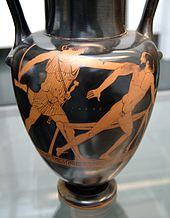- Procrustes
-
"Damastes" redirects here. See also Huntsman spider.For the Larry Niven story, see Procrustes (short story).
 Theseus and Procrustes, Attic red-figure neck-amphora, 570–560 BC, Staatliche Antikensammlungen (Inv. 2325)
Theseus and Procrustes, Attic red-figure neck-amphora, 570–560 BC, Staatliche Antikensammlungen (Inv. 2325)
In Greek mythology Procrustes (Προκρούστης) or "the stretcher [who hammers out the metal]", also known as Prokoptas or Damastes (Δαμαστής) "subduer", was a rogue smith and bandit from Attica who physically attacked people by stretching them or cutting off their legs, so as to force them to fit the size of an iron bed. In general, when something is Procrustean, different lengths or sizes or properties are fitted to an arbitrary standard.
Contents
In Greek mythology
In the Greek myth, Procrustes was a son of Poseidon with a stronghold on Mount Korydallos at Erineus, on the sacred way between Athens and Eleusis.[1] There he had an iron bed, in which he invited every passer-by to spend the night, and where he set to work on them with his smith's hammer, to stretch them to fit. In later tellings, if the guest proved too tall, Procrustes would amputate the excess length; nobody ever fitted the bed exactly, because secretly Procrustes had two beds.[2] Procrustes continued his reign of terror until he was captured by Theseus, travelling to Athens along the sacred way, who "fitted" Procrustes to his own bed:
He killed Damastes, surnamed Procrustes, by compelling him to make his own body fit his bed, as he had been wont to do with those of strangers. And he did this in imitation of Heracles. For that hero punished those who offered him violence in the manner in which they had plotted to serve him.[3]
Killing Procrustes was Theseus's last adventure on his journey from Troezen to Athens.
Contemporary usage
A Procrustean bed/couch is an arbitrary standard to which exact conformity is forced. In Edgar Allan Poe's The Purloined Letter, the private detective Dupin uses the metaphor of a Procrustean bed to describe the Parisian police's overly rigid method of looking for clues. Jacques Derrida, in "The Purveyor of Truth," his response to Jacques Lacan's seminar on "The Purloined Letter" (1956), applies the metaphor to the structural analysis of texts: "By framing in this violent way, by cutting the narrated figure itself from a fourth side in order to see only triangles, one evades perhaps a certain complication."[4] This is one of deconstruction's central critiques of structural (and formal) literary analysis.
Procrustes analysis is the process of performing a shape-preserving Euclidean transformation to a set of shapes. This removes variations in translation, rotation and scaling across the dataset in order to move them into a common frame of reference. This is generally the precursor to further statistical analysis. A related problem in linear algebra is the orthogonal Procrustes problem of finding the closest orthogonal matrix to any given matrix.
A Procrustean solution is the undesirable practice of tailoring data to fit its container or some other preconceived structure. A common example from the business world is embodied in the notion that no résumé should exceed one page in length.
In a Procrustean solution in statistics, instead of finding the best fit line to a scatter plot of data, one first chooses the line one wants, then selects only the data that fits it, disregarding data that does not, so to "prove" some idea. It is a form of rhetorical deception made to forward one set of interests at the expense of others. The unique goal of the Procrustean solution is not win-win, but rather that Procrustes wins and the other loses. In this case, the defeat of the opponent justifies the deceptive means.
In computer science, a Procrustean string is a fixed length string into which strings of varying lengths are placed. If the string inserted is too short, then it is padded out, usually with spaces or null characters. If the string inserted is too long, it is truncated. The concept is mentioned in the Sinclair ZX81 and Sinclair Spectrum user manuals, where a portion of a string is replaced by another string using Procrustean assignment—the replacement string is truncated or padded in order to have length equal to the portion being replaced.[5] Although the term did not catch on in wider usage, it appears in some references, notably FOLDOC.[6]
See also
References
- Notes
- ^ Tripp, Edward. The Meridian Handbook of Classical Mythology. Meridian, 1970, p. 498.
- ^ This detail, which injects a note of verisimilitude, is reported by both pseudo-Apollodorus (Epitome1.4) and Hyginus. "Later it was stated, by those who did not think of the meaning of Prokrustes, Prokoptas and Damastes, that he even had two beds, a large one and a small one." (Karl Kerenyi, The Heroes of the Greeks, 1959:223, noting pseudo-ApollodorusDiodorus Siculus, 4.59.5.)
- ^ Plutarch, Vita Thesei §11a. (Theoi.com on-line English translation).
- ^ Derrida, Jacques, "The Purveyor of Truth," in The Purloined Poe: Lacan, Derrida, and Psychoanalytic Reading eds. John P. Muller and William J. Richardson,
- ^ Vickers, Steven (1981). Sinclair ZX81 BASIC Programming. Sinclair Research Limited. Chapter 21.
- ^ Howe, Denis (12 September 1997). "Procrustean string". Free On-line Dictionary of Computing. http://foldoc.org/index.cgi?query=procrustean+string. Retrieved 3 June 2007.
- Bibliography
- Kuehnelt-Leddihn, Erik von The Menace of the Herd or Procrustes At Large
- Riordan, Rick. Percy Jackson & The Olympians: The Lightning Thief
External links
 Media related to Procrustes at Wikimedia Commons
Media related to Procrustes at Wikimedia Commons
Categories:- Greek mythology
- Metaphors referring to people
- Labours of Theseus
Wikimedia Foundation. 2010.
